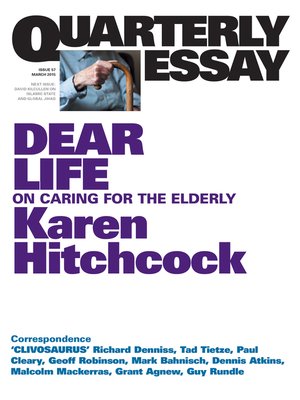
Sign up to save your library
With an OverDrive account, you can save your favorite libraries for at-a-glance information about availability. Find out more about OverDrive accounts.
Find this title in Libby, the library reading app by OverDrive.



Search for a digital library with this title
Title found at these libraries:
| Library Name | Distance |
|---|---|
| Loading... |
In this moving and controversial Quarterly Essay, doctor and writer Karen Hitchcock investigates the treatment of the elderly and dying through some unforgettable cases. With honesty and deep experience, she looks at end-of-life decisions, frailty and dementia, over-treatment and escalating costs.
Ours is a society in which ageism, often disguised, threatens to turn the elderly into a "burden" – difficult, hopeless, expensive and homogenous. While we rightly seek to curb treatment when it is futile, harmful or against a patient's wishes, this can sometimes lead to limits on care that suit the system rather than the person. Doctors may declare a situation hopeless when it may not be so.
We must plan for a future when more of us will be old, Hitchcock argues, with the aim of making that time better, not shorter. And we must change our institutions and society to meet the needs of an ageing population. Dear Life is a landmark essay by one of Australia's most powerful writers.
"The elderly, the frail are our society. They are our parents and grandparents, our carers and neighbours, and they are every one of us in the not-too-distant future . . . They are not a growing cost to be managed or a burden to be shifted or a horror to be hidden away, but people whose needs require us to change." —Karen Hitchcock, Dear Life
Ours is a society in which ageism, often disguised, threatens to turn the elderly into a "burden" – difficult, hopeless, expensive and homogenous. While we rightly seek to curb treatment when it is futile, harmful or against a patient's wishes, this can sometimes lead to limits on care that suit the system rather than the person. Doctors may declare a situation hopeless when it may not be so.
We must plan for a future when more of us will be old, Hitchcock argues, with the aim of making that time better, not shorter. And we must change our institutions and society to meet the needs of an ageing population. Dear Life is a landmark essay by one of Australia's most powerful writers.
"The elderly, the frail are our society. They are our parents and grandparents, our carers and neighbours, and they are every one of us in the not-too-distant future . . . They are not a growing cost to be managed or a burden to be shifted or a horror to be hidden away, but people whose needs require us to change." —Karen Hitchcock, Dear Life







